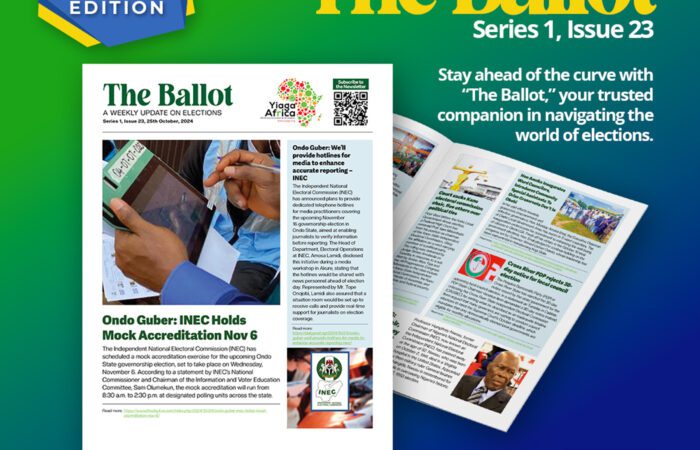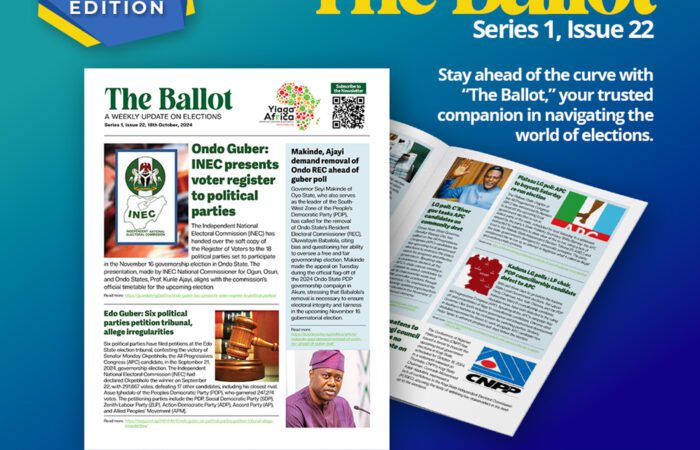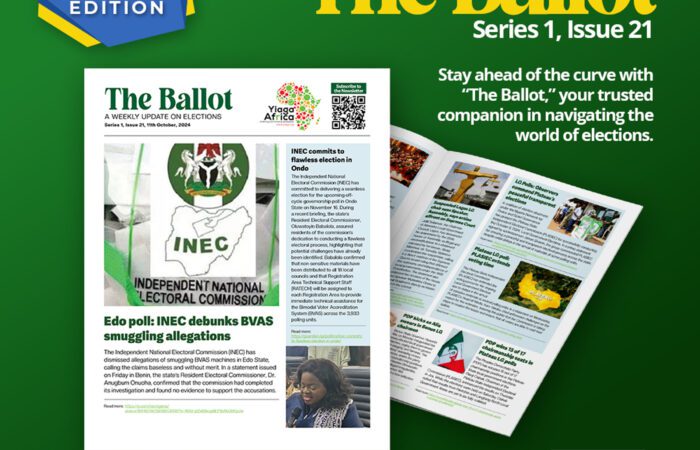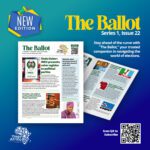- INTRODUCTION
In line with INEC’s timetable and schedule of activities for the 2019 elections, political parties were required to conduct primary elections to select candidates for various positions to be contested in the February 16 and March 2 2019. Based on the timeline, political parties were required to conclude all primary elections by the 7th October 2018. The conduct of party primaries remains a precursor to, and indeed a prerequisite for nominating candidates in an election. Political parties are the only association or platforms permitted by law to present candidates for elections.
As part of efforts to deepen the integrity of the candidate selection process, YIAGA AFRICA Watching The Vote observed the conduct of party primaries to assess their compliance with democratic principles, norms and standards enshrined in the legal framework for elections. The observation entailed highlighting recommendations for improving the integrity and quality of party primaries.
Compared to previous general elections, the primary elections for the 2019 elections is peculiar for diverse reasons. First, there’s a significant increase in the number of parties that submitted notices for the conduct of party primaries. According to INEC, 89 out of 91 registered political parties submitted notices as required by Section 85 (1) of the Electoral Act 2010 as amended. Secondly, some parties adopted the direct mode of primaries and thirdly, there was an increase in the number of young people and women aspiring to run for office.
- METHODOLOGY
YIAGA AFRICA Watching The Vote deployed direct observation of the party primaries, interviews and desk review of media reports. For the direct observation, YIAGA AFRICA WTV deployed at least two (2) Long Term Observers (LTOs), to observe presidential primaries of African Democratic Congress (ADC), All Progressive Congress (APC), People’s Democratic Party (PDP) and Social Democratic Party (SDP). The LTOs were equipped with specially designed checklist that gather data on the conduct of the primary election in line with party constitutions and guidelines and INEC Regulation on Party Primaries. In addition, the checklist was designed to track inclusion, equality, equity and transparency of the process of the party primaries. YIAGA AFRICA also conducted desk review from readily available resources on the primaries and conducted interviews with aspirants, delegates and INEC officials. The Individuals were identified from over 10 political parties, including PDP and APC.
- PRELIMINARY FINDINGS ON THE OBSERVATION OF THE POLITICAL PARTIES PRIMARIES
Watching the Vote findings are based on the reports of the observers deployed to observe the primaries, interactions with delegates and news reports reviewed. The preliminary findings include:
- Compliance with Legal Framework: The conduct of primaries is regulated by the legal framework for elections which encompasses the Constitution of the Federal Republic of Nigeria, Electoral Act 2010 (as amended), Independent National Electoral Commission (INEC) Guidelines for the conduct of Elections, Party Constitution and Party Guideline for the conduct of primaries. To ensure validity and legitimacy, parties are required to adhere to standards with respect to process and procedure. The process for the primaries must be democratic, open and transparent. Above all, it must guarantee the equal participation of party members and aspirants. On compliance with legal framework, Watching The Vote notes the following;
a. Disregard for Guidelines on Primaries: WTV observed that parties willingly flouted their guidelines, constitutions, INEC Guidelines on Party Primaries as well as the Electoral Act. Most parties failed to submit the list of delegates to INEC prior to the conduct of primary elections. Some parties also conducted parallel primaries in contravention of laid down rules. This led to violence and disruption especially in Benue, Delta, Zamfara and Imo states. Section 87 of the 2010 Electoral Act as amended prescribes direct and indirect primaries as the procedure for nomination of candidates by parties. Contrary to this legally approved procedure, some of the parties adopted consensus as a mode for selecting candidates. This procedure didn’t avail all aspirants’ equal opportunity of being voted but resulted it to imposition of candidates.
b. Procedure for the Primaries: With respect to accreditation of delegates/party members, some of the parties made efforts to adhere to their procedures while some parties blatantly violated their rules. WTV observed major challenges with all the procedures for primaries adopted by parties. Principal amongst the challenges is the absence of a credible register of party members or delegates and the overbearing influence/interference of party leadership at different levels with the process of the primaries. The indirect primaries were fraught with the following challenges;
i. absence of an authentic and unaltered list of delegates before the commencement of the primaries,
ii. undefined process of accreditation of delegates,
iii. alteration of the process for primary election by the party leaders present.
For the direct primaries, WTV observers noted the following lapses;
i. absence of a credible and updated register of members eligible to vote,
ii. lack of uniformity in the voting process which provided an opportunity for manipulation. For instance, some states adopted voice votes while others used the ballot system
iii. lack of transparency in the process of counting of votes, collation and transmission of the votes cast by members of the party. This disregard for procedure resulted in the disruption of the process and violence leading to loss of lives and properties in some States. and disenfranchisement of party members and aspirants.
2. High Cost of Nomination: The Constitution of Nigeria, empowers INEC to develop guidelines to regulate political parties and promote internal democracy, fair and transparent primaries. Accordingly, the INEC guideline for the conduct of primaries precludes political parties from creating rules or imposing conditions or setting high cost in nomination fees that exclude aspirants. This was however not the case as different parties imposed exorbitant nomination fees that invariably excluded women and young people. This was not limited to the dominant parties as we had more parties impose fees that were not reasonable, justifiable and suitable for our current economic realities.
Monetized Process: The primaries were a shameful display of politicians’ and political parties’ disregard for democratic principles and the sanctity of citizens’ participation. As observed during the primaries, delegates in the indirect primaries were induced with money in both local and international currencies. This was also the case in direct primaries where some aspirants spent millions to get votes. This unsavory and intimidating role of money in our electoral process is a major threat to the credibility of the 2019 general elections and it raises a major question of legitimacy of persons that emerge through a process where the votes were bought.
3. Access and Transparency: WTV assessed the level of access to information and access to the venue of party primaries for aspirants, observer groups and other stakeholders. WTV observed the following;
a. There were challenges with access to a fair contest. Aspirants were not given equal opportunity of being voted for by members of the party and delegates. Aspirants were unjustly screened out while some were denied the opportunity to purchase party nomination forms and participate in the screening process
b. Independent and non-partisan observer groups like YIAGA AFRICA experienced challenges getting accredited by parties to observe the primary election. As observed, the newer and less dominant parties like the ADC and SDP were more amenable to accrediting independent groups to observe the primaries while parties like the APC and the PDP were indignant in their decision to refuse accreditation of observer groups. Parties to understand that granting access to observer groups adds value to the process, provides resourceful recommendations to parties and provides information to the electorates who are the major determinants of the outcome of the election.
4. Inclusion and Diversity: Political party primaries must promote the principles of inclusion and diversity to ensure equality and fairness. The just concluded primaries was fraught with high incidence of exclusion of women, young people and persons with disability as aspirants, party members or delegates. For instance, none of the Presidential Aspirants for the APC, PDP, SDP was a woman, only the ADC had one female aspirant. For the delegates, there was also a very low `representation of women, youth and PWD. According to the WTV observation reports for the Presidential primaries in the FCT, APC had about 30 Persons with Disability, more than 200 women and more than 700 young persons present at the primaries held at the Old Parade Ground for Bwari and Abuja Municipal Area Councils. For the ADC, out of the 1,181 delegates, about 300 were women, about 600 and more where young people and 3 were persons with disability. PDP had more than 50 women, more than 100 young people and 5 PWD amongst the 3,274 delegates that voted at the national convention. For the SDP, there were over 50 women delegates out of the 1,726, 200 youth delegates and 1 person with disability.
5. Accountability and Substitution of Candidates: While the presidential primaries had less cases of aspirant suppression the same cannot be said of legislative primary elections. For the presidential primaries, parties like PDP, SDP and ADC gave equal opportunity to aspirants to address delegates and audience. This was not the case in the primaries for legislative seats and Governorship primaries. Reports indicate that several aspirants especially women and youth were willfully excluded from contesting in the shoddy primaries. We observed deliberate substitution of candidates who won in primaries with supposed “anointed choices” of party leaders as well as disruption of voting and counting process of primaries to deny leading aspirants of their opportunity to emerge as party’s candidate. In some instances, aspirants were disqualified from participating in the primaries in order to make way for anointed candidates. This is contrary to the provisions of the electoral act on internal democracy and openness, and also negates judicial decisions demanding that only candidates who contest in a primary can participate in the main election.
4. IMPLICATIONS FOR THE 2019 GENERAL ELECTIONS
In the light of the foregoing, Watching The Vote fears that the outcome of the nomination process will affect the 2019 General elections in the following ways;
- A HARVEST OF PRE-ELECTION LITIGATIONS: A possible fallout from the manipulations, impositions and disregard to extant laws in the conduct of the just concluded party primaries is a harvest of pre-election litigations. The mandate of the people will be determined in the law courts instead of the polling booths. This could even lead to the cancellation of outcomes of elections by the court in some cases result to loss of huge public funds and resources expended on the conduct of the elections. Considering that the recent amendment to Section 285 of the Constitution, provides for the court to deliver its judgment in every pre-election matter within 180 days of from the date of filling, this means that some of the pre-election matters will be decided after the conduct of the election. This could possibly amount to a reversal of the gains so far made in our efforts at reforming, sanitizing and ensuring uniformity in our electoral system and process. Nigeria cannot afford to continue taking one step forward and several many others backwards in our democratic journey.
- HIGH INCIDENCE OF VOTE BUYING AND SELLING: The buying and selling of votes remains one of the most potent threats to democracy and good governance in the country. Again, this ugly trend which has become chronic, largely influenced the primaries of various political parties. In a bid to secure party tickets, delegates were enticed with different forms of inducements, especially cash, signaling that these candidates will equally seek to induce the electorates in the main elections. The fear is that the mandate of the Nigerians will be on auction and will very likely go to the highest bidder in the 2019 general elections. The negative impact of this on democracy and good governance can never be overemphasized and is well documented in YIAGA AFRICA report on vote buying and selling tagged ‘Duly Purchased or Duly Elected?’.
- POLITICAL EXCLUSION: As highlighted earlier, the just concluded primaries witnessed a high rate of political exclusion, especially of the women and youth. This exclusion came in the form of high cost of nomination and expression of interest forms, outright refusal to sell forms to especially young females, undue disqualifications, impositions, etc. This implies that the largest chunk of our population and indeed the electorates were deprived of the opportunity of running for offices in the forthcoming elections. Democracy should be inclusive and participatory in nature.
- POLITICAL VIOLENCE: Even more disturbing is the violent nature of the primaries as those who felt aggrieved and unduly excluded from participating in the process owing to the imposition of candidates and shifting of the goal post by parties have resorted to self-help. If the internal process of candidates’ selection could be so rancorous and violent, leading to the loss of lives and properties, one is therefore left to imagine what would become of the general election. Apart from the loss of lives, properties and economic activities, electoral violence could deter the electorates, especially the most vulnerable amongst us (women and people living with disabilities) from participating in the elections.
- RECOMMENDATIONS
1. Watching The Vote calls on the Independent National Electoral Commission (INEC) to make public its report on the monitoring of political parties’ primaries.
- Relying on the strength of the decision of the Supreme Court in Hembe’s Case and Danladi’s case (SC/583/2016 and SC/733/2016), YIAGA AFRICA recommends that INEC should not accept candidates’ list that do not reflect the outcome of the primaries especially where parties substitute candidates who emerged from the primaries or where primaries were not held in line with the Electoral Laws.
- Watching The Vote calls on all candidates especially the women and youth candidates who successfully emerged from the primaries to remain vigilant and ensure that parties do not substitute their names at the point of submission to the Commission.
- Watching The Vote calls on INEC to deploy efforts in strengthening its processes of monitoring campaign financing by candidates and political parties and party supporters in line with the Electoral Act. INEC should seek inter-agency support and Civil Society partnership to enhance its effectiveness in monitoring campaign spending.
- Watching The Vote calls on the Courts to expediently hear and decide pre-election matters to reduce the probability of having outcomes of election invalidated on the grounds of improper conduct of primaries or unjust and undemocratic practices discrediting the legitimacy of the primaries.
- Watching The Vote calls on citizens and political party supporters to elevate the conversation as we proceed to the campaign season to issues that will impact on the lives of citizens and promote National development. YIAGA emphatically pleads with citizens to protect the sanctity of the votes and focus on voting the candidates of their choice devoid of the influence of money or any other form of inducement.
Thank you.
Ezenwa Nwagwu
Co-Chair, Watching The Vote Working Group
Cynthia Mbamalu
Project Director, YIAGA AFRICA Watching The Vote
For media inquiries please contact:
Moshood Isah
Communication Officer, YIAGA AFRICA
Tel. +234 (0) 703 666 9339, Email: misah@yiaga.org
Learn more about #WatchingTheVote at www.watchingthevote.org or on social media on Facebook at facebook.com/yiaga.org or on Twitter @YIAGA.






